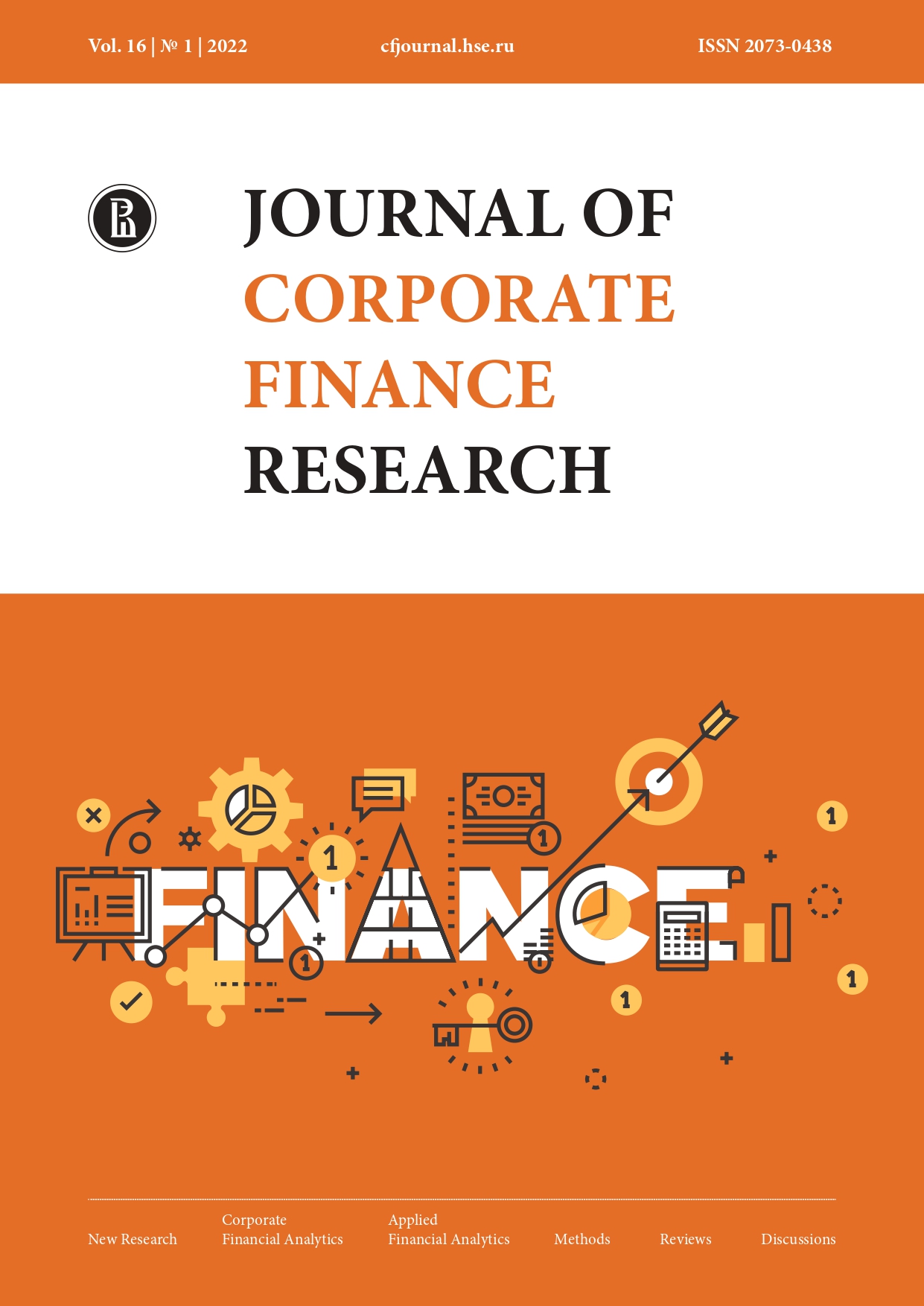Accounting for ESG Risks in the Discount Rate for Business Valuation
Abstract
The research is aimed at developing tools for determining and justifying specific ESG risks for the purpose of accounting for projected cash flows in the discount rate in business valuation. A study of modern methods, standards and publications in this area has been conducted, and the need for their refinement and development for practical use has been determined.
The research used the results of the works by foreign and domestic authors, as well as their own professional experience. The authors used general scientific methods of cognition, such as classification, logical and system analysis, typology and generalization.
The proposed tools are aimed at substantiating, supplementing and clarifying the discount rate model (CAPM) by introducing additional coefficients that take into account the influence of ESG factors. The article proposes a scoring model for assessing risks on a point scale and tools for their subsequent translation into correction coefficients using the method of expert assessments, which already allow them to be applied in practice today. The model of accounting for specific risks is based on data from literary sources, and demonstrated using a practical example.
The author’s tool is designed to provide analysts, appraisers and experts with a qualitative justification and calculation of specific risks associated with ESG factors when evaluating a business. It is also assumed that the proposed tools will serve as one of the criteria for managing business value, allowing for measures to reduce specific risks and increase company capitalization.
Downloads
References
Environmental, social, and governance (ESG) investing in the United States. Cerulli Associates. 2019. URL: https://info.cerulli.com/US-ESG-2019.html
Pastor L., Stambaugh R.F., Taylor L.A. Sustainable investing in equilibrium NBER Working Paper. 2020;(26549). URL: https://www.nber.org/system/files/working_papers/w26549/w26549.pdf DOI: https://doi.org/10.3386/w26549
Akhmetshina A., Kaspina R., Vagizova V., Ivanov S. Business model as a tool for increasing the market capitalization and reducing environmental impact of the company. Procedia Environmental Science, Engineering and Management. 2020,7(3):367-373. URL: http://www.procedia-esem.eu/pdf/issues/2020/no3/10_42_Akhmetshina_20.pdf
Khorin A., Krikunov A. ESG-risk factors and value multiplier of telecommunications companies. Journal of Corporate Finance Research. 2021;15(4):56-65. https://doi.org/10.17323/j.jcfr.2073- 0438.15.4.2021.56-65 DOI: https://doi.org/10.17323/j.jcfr.2073-0438.15.4.2021.56-65
Ashwin Kumar N.C., Smith C., Badis L., Wang N., Ambrosy P., Tavares R. ESG factors and risk-adjusted performance: A new quantitative model. Journal of Sustainable Finance & Investment. 2016;6(4):292-300. https://doi.org/10.1080/20430795.2016.1234909 DOI: https://doi.org/10.1080/20430795.2016.1234909
Cornell B. ESG preferences, risk and return. European Financial Management. 2021;27(1):12-19. https://doi.org/10.1111/eufm.12295 DOI: https://doi.org/10.1111/eufm.12295
Efimova O.V. Integrating sustainability issues into investment decision evaluation. Journal of Reviews on Global Economics. 2018;7:668-681. https://doi.org/10.6000/1929-7092.2018.07.61 DOI: https://doi.org/10.6000/1929-7092.2018.07.61
Feoktistova E.N., Alenicheva L.V., Dolgikh E.I., Kopylova G.A., Ozeryanskaya M.N., Khonyakova N.V. Analytical review of corporate non-financial reports: 2015-2016. Moscow: Russian Union of Industrialists and Entrepreneurs; 2017. 136 p. URL: https://rspp.ru/document/1/7/4/743222fc4c6650093518c635d0e8ecdd.pdf (In Russ.).
Zakhmatov D.Yu. The attitude of corporate business in the Russian Federation to the management of environmental, social risks, as well as corporate governance risks (ESG risks). Kazanskii ekonomicheskii vestnik = Kazan Economic Bulletin. 2021;(6):29-38. (In Russ.).
Feoktistova E.N., Alenicheva L.V., Kopylova G.A., Ozeryanskaya M.N., Purtova D.R., Khonyakova N.V. Analytical review of corporate non-financial reports: 2017-2018. Moscow: Russian Union of Industrialists and Entrepreneurs; 2019. 104 p. URL: https://рспп.рф/download/a48b14d9858856285b5f7aba0c57b076/ (In Russ.).
Berg F., Kölbel J.F., Rigobon R. Aggregate confusion: The divergence of ESG ratings. SSRN Electronic Journal. 2019. http://dx.doi.org/10.2139/ssrn.3438533 DOI: https://doi.org/10.2139/ssrn.3438533
A practical guide to sustainability reporting using GRI and SASB standards. Amsterdam: Global Reporting Initiative; 2021. 42 p. URL https://www.globalreporting.org/media/mlkjpn1i/gri-sasb-joint-publication-april-2021.pdf
Verles M., Vellacott T. Business and the sustainable development goals: Best practices to seize opportunity and maximise credibility. Geneva: Gold Standard; 2018. 19 p. URL: https://www.goldstandard.org/sites/default/files/documents/sdg_report_optimized.pdf
Cornell B., Damodaran A. Valuing ESG: Doing good or sounding good? SSRN Electronic Journal. 2020. http://dx.doi.org/10.2139/ssrn.3557432 DOI: https://doi.org/10.2139/ssrn.3557432
Perspectives paper: ESG and business valuation. IVSC. Mar. 02, 2021. URL: https://www.ivsc.org/perspectives-paper-esg-and-business-valuation/
Perspectives paper: A framework to assess ESG value creation. IVSC. May 26, 2021 URL: https://www.ivsc.org/a-framework-to-assess-esg-value-creation/
Perspectives paper: ESG and real estate valuation. IVSC. Oct. 14, 2021 URL: https://www.ivsc.org/esg-and-real-estate-valuation/
Aronsohn A. Survey: ESG & valuation. IVSC. Feb. 14, 2022. URL: https://www.ivsc.org/esg-survey/
European valuation standards (EVS). TEGOVA. 2021. URL: https://tegova.org/european-valuation-standards-evs
RICS valuation – global standards. London: RICS; 2021. 296 p. URL: https://www.rics.org/globalassets/rics-website/media/upholding-professional-standards/sector-standards/valuation/2021-11-25_rics-valuation--global-standards-effective-2022.pdf
Ilhan E., Sautner Z., Vilkov G. Carbon tail risk. The Review of Financial Studies. 2021;34(3):1540-1571. https://doi.org/10.1093/rfs/hhaa071 DOI: https://doi.org/10.1093/rfs/hhaa071
Trugman G.R. Understanding business valuation: A practical guide to valuing small to medium sized businesses. 3rd ed. New York: American Institute of Certified Public Accountants; 2008. 943 p.
Mercer Z.C. The adjusted capital asset pricing model for developing capitalization rates: An extension of previous “build-up” methodologies based upon the capital asset pricing model. Business Valuation Review. 1989;8(4):147-156. https://doi.org/10.5791/0882-2875-8.4.147 DOI: https://doi.org/10.5791/0882-2875-8.4.147
Mercer Z.C., Harms T.W. Business valuation: An integrated theory. Hoboken, NJ: John Wiley & Sons, Inc.; 2008. 288 p.
Practical guide to valuating RUSNANO assets. Moscow: ROSNANO; 2010. 132 p. URL: https://www.ocenchik.ru/site/met/rosnano1.pdf (In Russ.).
Methodology and guidelines for conducting business and/or assets valuation of RAO “UES of Russia” and SDCs of RAO “UES of Russia”. Deloitte & Touche. 2007. URL: https://www.ocenchik.ru/method/business/260/ (In Russ.).
Dellham D., Mueller H. A new vision of value: Connecting corporate and societal value creation. Amstelveen: KPMG; 2014. 116 p. URL: https://home.kpmg/content/dam/kpmg/pdf/2014/11/A-New-Vision-of-Value.pdf
The true price of jeans. Amsterdam: Impact Institute; 2019. 30 p. URL: https://trueprice.org/wp-content/uploads/2019/06/Impact-Institute-Report-True-Price-of-Jeans.pdf
Copyright (c) 2022 National Research University Higher School of Economics

This work is licensed under a Creative Commons Attribution-NonCommercial-NoDerivatives 4.0 International License.

